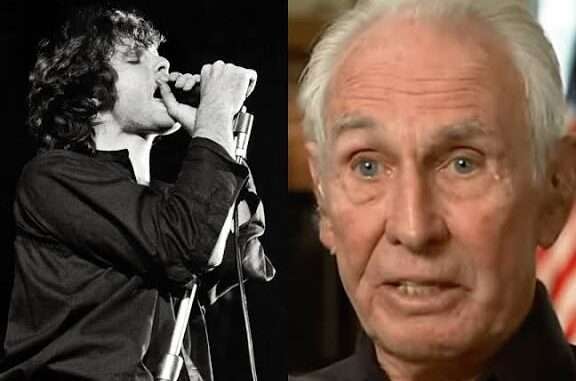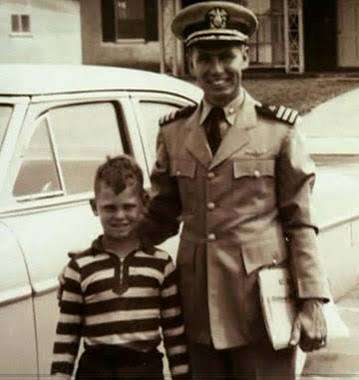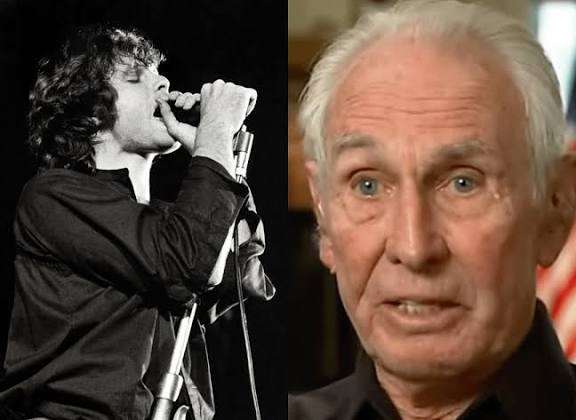
Jim Morrison was a man of contradiction—poet and provocateur, mystic and rebel, philosopher and rock star. To his generation, he was a symbol of resistance against conformity and war, a voice for those disillusioned by authority and the blood-soaked politics of the 1960s. But few knew the deeper irony that haunted him: while he publicly condemned the Vietnam War and rejected militarism, his own father, Rear Admiral George Stephen Morrison, played a significant role in the event that sparked America’s entry into that very conflict.
In one of his rare candid moments, Jim Morrison reflected on his upbringing, saying he wanted nothing to do with the military. “My dad may have started that war,” he reportedly remarked in bitter irony. For Morrison, the son of a decorated naval officer, the rebellion wasn’t just against society—it was deeply personal.
Rear Admiral Morrison commanded the U.S. naval forces during the infamous **Gulf of Tonkin Incident** in 1964, a skirmish that became the justification for America’s full-scale involvement in Vietnam. The incident involved reports that U.S. destroyers, including the USS *Maddox*, were attacked by North Vietnamese torpedo boats. However, years later, declassified documents revealed that the supposed second attack—the one used to justify the war—likely never happened at all. The confusion, or deliberate distortion, set in motion one of the most devastating military campaigns in American history.
For Jim, who had already begun exploring art, philosophy, and music at UCLA, this revelation only deepened his distrust of power. The anti-war movement became part of his identity, woven into his poetry and public statements. He saw war as a mechanism of control—an illusion of heroism masking the machinery of death. Morrison viewed the Vietnam War not as a noble cause but as a tragic symptom of America’s moral decay.
“The war is bad,” Morrison once said bluntly. “It’s men sending other men to die for reasons they can’t explain.” He refused to glorify violence or nationalism, and his performances with *The Doors* often reflected his vision of freedom not as patriotism, but as liberation from societal lies.
What made Jim Morrison’s rejection of the military even more poignant was his awareness of his father’s role in shaping that system. George Morrison, a career naval officer, represented discipline, order, and duty—everything Jim defied. Their relationship was strained, defined by silence rather than understanding. Jim once claimed he was “dead” to his family, and in a way, the cultural and emotional gulf between them mirrored the generational divide tearing America apart.
While George Morrison’s service placed him in the heart of American power, Jim’s art became the voice of those questioning it. His lyrics from *The Doors*—songs like *“The Unknown Soldier”*—were raw commentaries on the absurdity of war and the loss of innocence. In his performances, he embodied both anger and empathy, the ghost of a generation fighting to wake from a national nightmare.
Yet, beneath the rebellion was also sadness. Jim Morrison understood that he and his father were two sides of the same coin—both men shaped by the American dream, both chasing truth in their own ways. But while his father served the system, Jim sought to expose it.
In rejecting the military, Jim wasn’t simply turning his back on his father; he was confronting the entire ideology that had defined his upbringing. To him, war was the ultimate failure of imagination—a refusal to understand, to listen, to love.
When Morrison died in 1971, his relationship with his father remained unresolved. Rear Admiral Morrison lived until 2008, having retired from the Navy and later expressing pride in his son’s artistic achievements. But the irony lingered: one man’s military order had helped start a war, and the other’s poetic chaos had helped question it.
Jim Morrison’s rebellion was not just about rock and roll or fame—it was about conscience. His rejection of war, born from his father’s role in it, revealed the deep fracture between America’s past and its awakening youth.
In the end, Morrison became not only a rock icon but a tragic philosopher of peace—a man who saw through the illusions of power and paid the price for speaking the truth. He once said, “Whoever controls the media, controls the mind.” But in rejecting control and embracing chaos, Jim Morrison gave his generation something far more dangerous: the freedom to think for themselves.
Leave a Reply